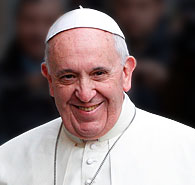Womanhood: Equality and Difference
On February 7, 2015 Pope Francis addressed the Pontifical Council for Culture as they concluded their Plenary Assembly, in which they reflected upon the theme “Feminine cultures: equality and difference.” He began by stating that this topic is “very close to my heart” and noted that he has previously spoke on it (see The Important Role of Women, The Gift of Motherhood, and Women Should Be Valued).
The pope gave the Council five themes to guide their work: Between equality and difference: finding equilibrium, “generativity” as a symbolic code, the female body in culture and biology, women and religion: flee or seek to participate in the life of the Church? and finally, in the family and public sphere.
Through these themes, a woman’s role in the family was particularly highlighted. Starting with the relationship between man and woman, the Holy Father proposed it as a relationship of reciprocity. Woman is not socially subordinate to man; instead, she is different but nonetheless equal. Both sexes are absolutely necessary, since though man and woman share the same human nature, they are two separate revelations of that nature. One sex is necessary for the other and vice versa, and in this “they truly complete the fullness of the person.”
Motherhood, he said, can be summarized into four phases: “desire, bring into the world, care for and let go.” In this way, the mother transmits and protects the life of her children. Mothers play an irreplaceable role in the family. The Holy Father said, “The qualities of delicacy, particular sensitivity and tenderness, which enriches the feminine soul, represent not only a genuine strength for the life of the family, to illuminate a climate of serenity and harmony, but also a reality without which the human vocation would be unattainable.”
Family life is not all that a mother is called to, however. Pope Francis noted that wives and mothers should also be given the opportunity to be active in social and ecclesial matters, in a way that fosters a harmony with their family life. Women are called to be present in communities, pastoral responsibilities, and theological reflections, among other things.
Pope Francis very affectionately thanked women for their contributions in the world: “I note and I encourage the contribution of so many women who work within the family, in the areas of teaching the faith, pastoral work, schooling, but also in social, cultural and economic structures. You women know how to embody the tender face of God, his mercy, which is translated into a willingness to give time rather than to occupy space, to welcome rather than to exclude.”
In this way, the Church is described as being feminine because it is a “welcoming womb which regenerates life.”





